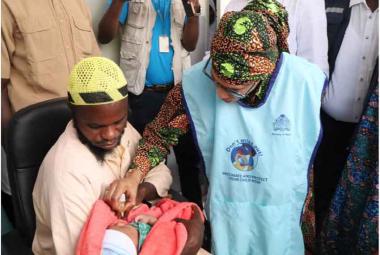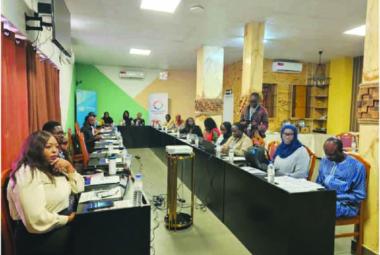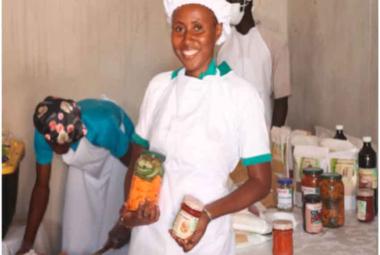By Awa Sowe
The rollout of the world’s first malaria vaccine began in Cameroon on Monday, 22 January, 2024. This is said to be a “transformative chapter in Africa’s public health history”.
The information was revealed in a press release issued by the Medical Research Council Unit The Gambia at the London School of Hygiene and Tropical Medicine (MRCG at LSHTM), whose researchers have been very much involved in the research and trials.
The RTS,S vaccine – 662,000 doses of it – will be administered to children in the west African country, the first to be vaccinated after successful trials of the drug in Ghana, Kenya and Malawi between 2019 and 2021.
It marks a scaling up of the fight against malaria in Africa, where 95% of deaths from the disease occur, most among children under five. The rollout of the world’s first malaria vaccine, RTS,S, in Cameroon with over 6.6 million children expected to receive the vaccine in 20 African countries over the next two years.
Dr Mohammed Abdulaziz, the division head at the Africa Centre for Disease Control and Prevention, headquartered in Ethiopia, at a joint online briefing with the World Health Organization., has said, “for a long time we have been waiting for a day like this as it brings more than just hope; it brings a reduction in the mortality and morbidity associated with malaria”.
He went on: “We are not just witnessing but actively participating in a transformative chapter in Africa’s public health history.”
Public health experts said that communication with the public will be crucial to the vaccine’s success to ensure that it is trusted, that people bring their children back for all four doses, and that people understand it will be most effective when combined with other measures, such as sleeping under insecticide-treated bed nets.
It is quite remarkable to mention that researchers at The Medical Research Council Unit The Gambia at the London School of Hygiene and Tropical Medicine (MRCG at LSHTM) have worked alongside local communities and volunteers since 1997 to research, develop and successfully implement the RTS,S malaria vaccine.
The vaccine trials have yielded remarkable results demonstrating that RTS,S, alongside antimalarial drugs before the rainy season, reduced severe malaria cases and deaths by nearly two-thirds.
Children who received the RTS,S drug combination and used bed nets had a greater than 90% protection against malaria episodes during the study.
The start of routine RTS,S vaccinations for malaria, organized by Gavi, WHO and UNICEF, has only been possible following decades of work by researchers in Africa working with international partners including MRCG at LSHTM.
Professor Umberto D’Alessandro, Director of MRCG at LSHTM, said: “Making the RTS,S vaccine available as a routine vaccination is only possible thanks to decades of work by researchers in Africa working with international partners, with clinical trials at MRCG at LSHTM starting back in 1997.
“The support of volunteers and communities both in The Gambia and the region has been vital in showing that RTS,S, the world’s first malaria vaccine, is safe and can save lives.
The Phase I trial, conducted between 1997-1998, showed vaccine safety. This paved the way for subsequent Phase II studies, conducted in infants and children across The Gambia and other endemic countries, which established the efficacy of RTS,S for reducing morbidity due to clinical malaria.
The final Phase III trial (2009-2014) involved 15,459 infants and young children across seven African countries, preventing approximately 39% of malaria cases and 29% of severe malaria cases over four years. An LSHTM-coordinated trial since 2017 immunised over 5,000 children in Burkina Faso and Mali.
Dr. Kalifa Bojang, Senior Clinical Scientist at MRCG at LSHTM, underscored the Unit’s commitment to eradicating malaria and its pivotal role in early RTS,S development.
“From clinical trials in The Gambia to subsequent trials that demonstrated the impact of RTS,S on reducing severe malaria cases and child mortality, MRCG at LSHTM remains a beacon of hope in the global pursuit of a malaria-free future.”
RTS,S is the first malaria vaccine recommended by WHO to prevent malaria in children (October 2021). It induces an immune response to the circumsporozoite protein antigen found on the surface of the Plasmodium falciparum sporozoite, the stage of the parasite that is injected by a mosquito.
WHO has recommended a schedule of four doses in children from around 5 months of age, with a fifth dose considered after one year in areas of high risk.
RTS,S was initially developed by GSK and the PATH Malaria Vaccine Initiative (MVI). A second vaccine, R21, developed by Oxford University received approval from WHO in 2023 using lessons learned from RTS, S.







